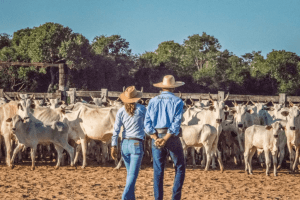Imagine a farmer alone dealing with a cattle herd; guiding the animals through the corral for an efficient vaccination or transportation, for instance. In Brazil, there are already many cattle farmers that can manage all this handling with nothing in their hands. Adriane Zart is one of them.
A daughter of farmers, the veterinarian worked with reproduction and genetic improvement when she learned about the “nada nas mãos” [nothing-in-hands] technique, created by the Brazilian veterinarian Paulo Loureiro. The inventive way of dealing with animals is simple: the farmer uses only his or her body language to communicate with the herd, establishing a relationship of trust that makes the animals respect the farmer and slowly and orderly guide themselves to the corral.

“When I saw the technique, I fell in love with it and I figured that it was what I wanted to do,” Zart says. In recent years, more veterinarians and farmers have also found out about the technique due to her training program that has spread across Brazil. Adriane says that those who already have the tradition of working with cattle learn it quickly: “The ‘nothing-in-hands‘ method aims to restore values of trust between humans and animals that have existed for centuries.” Altogether, 6.335 professionals from 368 farms have already been trained.
The technique is aligned with the growing demand for animal welfare in beef production. “We have this ethical duty to give the best possible life to the animals under our care,” says Zart. The method affects the animals’ health, which directly impacts the cattle’s productivity. This happens in an environment of lessened stress, which directly influences the meat quality. “Poor handling leads to bruising, which can make parts of the animal’s meat unfit for consumption.”
Working with Brazilian cattle led Adriane to the “Forbes” list of most influential women in agribusiness. “Seeing my name on ‘Forbes’ was the reassurance that I was on the right path. The dedication and love in training teams for management paid off, was acknowledged, and assured me that there is still much to be done,” she says.
Smart farming
Today, Adriane lives in Ireland while her training program continues to spread throughout Brazil. She works at the DataMars company, using her knowledge of animal behavior to create new technologies for farms worldwide. Among the products the company developed are sensors that can detect the animals’ movements, their eating habits, and more data that can provide insights into the herd’s health.
Zart arrived in Europe bringing her Brazilian expertise and feeling that all the experience makes a difference. “They know about our significant production and have always valued this knowledge that I brought from Brazil, of knowing what the farmer and the veterinarian need in their daily routine.”


